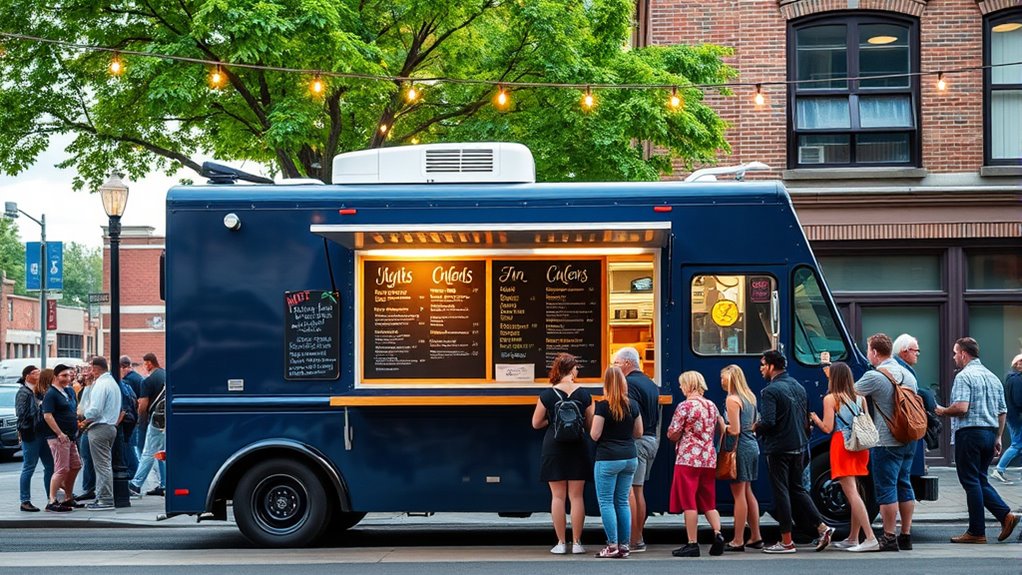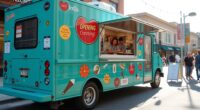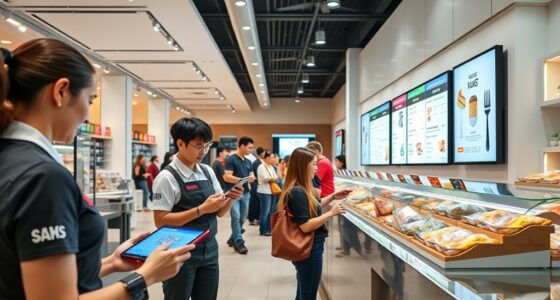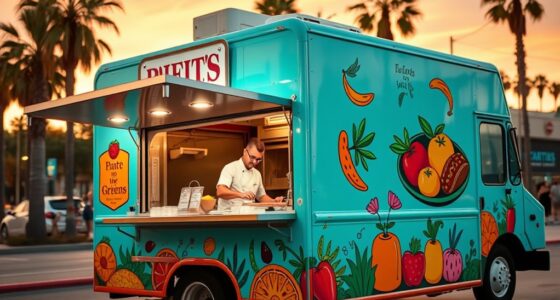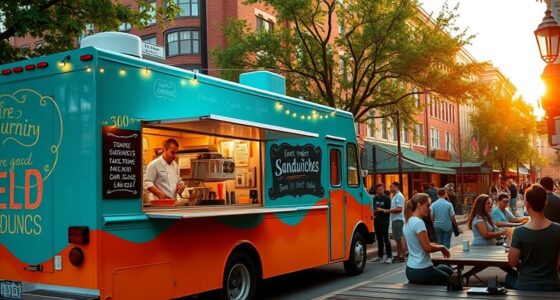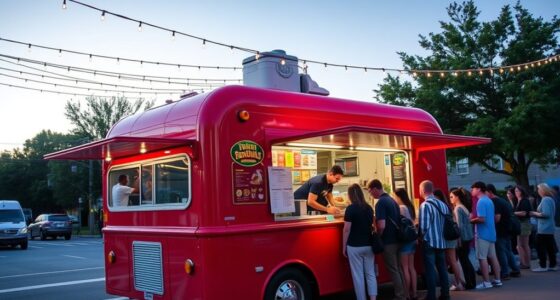To start a food truck in Spokane, WA, you’ll want to tap into the local food scene by engaging with communities, participating in festivals, and highlighting regional flavors on your menu. You’ll need to complete permits, meet sanitation standards, and secure insurance—all while planning your budget and selecting the right technology. Focus on marketing through social media and community events to build loyalty. Keep exploring these key steps, and you’ll uncover how to launch successfully in Spokane.
Key Takeaways
- Research Spokane’s local food scene, permits, and zoning laws to ensure compliance and identify opportunities.
- Develop a budget covering truck purchase, customization, permits, insurance, and initial marketing costs.
- Secure necessary permits, licenses, and health certifications through Spokane’s online application process.
- Design a menu featuring local ingredients and plan operations with efficient technology like mobile POS systems.
- Engage with Spokane community events, social media, and partnerships to build brand presence and customer loyalty.
Starting With Local Food Scene

Spokane’s vibrant food scene provides the perfect foundation for exploring its thriving food truck culture. To succeed, you need to prioritize food truck maintenance, ensuring your vehicle is reliable and clean—this builds trust with your customers. Listening to customer feedback strategies helps you refine your menu and service, making your trucks stand out locally. Engage with diners through social media or at your truck to gather insights and show you value their opinions. By understanding Spokane’s preferences, you can tailor your offerings to match local tastes and expectations. Consistent maintenance prevents breakdowns and keeps your operation running smoothly, while actively seeking feedback demonstrates your commitment to quality. Additionally, understanding the arcade machine industry can inspire innovative ways to entertain and engage your customers, such as incorporating themed games or entertainment options. Together, these elements help you establish a strong presence in the city’s dynamic food scene.
Understanding Local Requirements
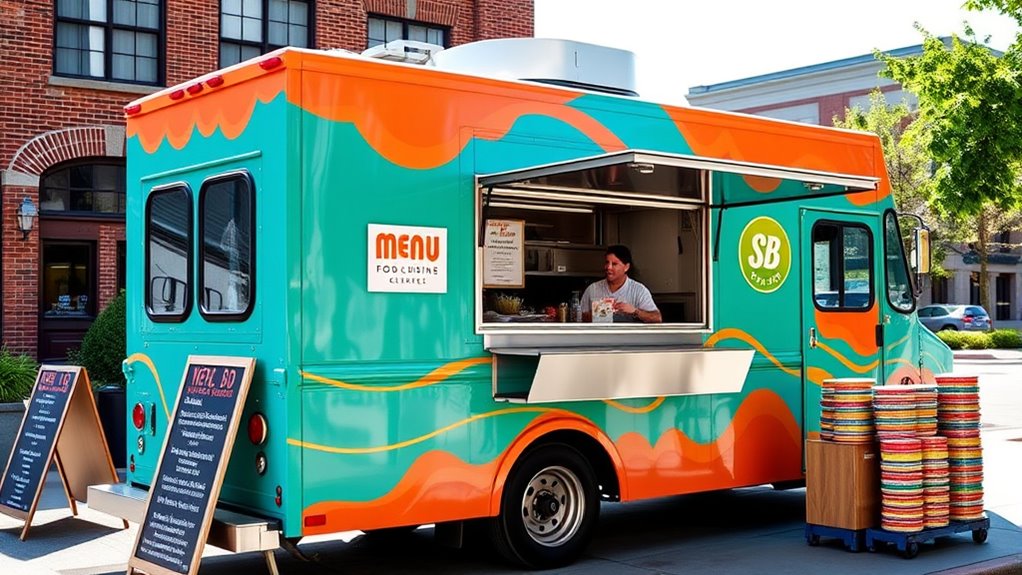
To operate your food truck in Spokane, you’ll need to complete an online permit application and gather the necessary sanitation documentation. It’s also important to familiarize yourself with designated truck parking zones to avoid violations. Staying on top of these local requirements guarantees a smooth start and helps you serve customers without issues. Additionally, understanding effective fraud prevention tools can help protect your payment processing systems from potential threats.
Online Permit Application Process
Are you aware of how to navigate Spokane’s online permit application system for food trucks? The online permit process is straightforward if you know where to look. First, visit the city’s official website and locate the food truck permit section. You’ll need to create an account or log in if you already have one. The application process involves filling out detailed forms about your truck, menu, and ownership details. Be prepared to upload required documents like proofs of insurance and vehicle registration. Double-check all info before submitting to avoid delays. Once submitted, monitor your email for confirmation or any additional requests from city officials. Completing the online permit application efficiently will get you closer to hitting Spokane’s streets with your food truck.
Sanitation Protocols and Documentation
Understanding Spokane’s sanitation protocols is essential for ensuring your food truck meets local health standards. You need to familiarize yourself with specific food safety requirements and sanitation standards set by the Spokane Regional Health District. This includes maintaining proper food handling practices, regular cleaning schedules, and appropriate waste disposal. Documentation is vital; you must keep records of staff training, daily cleaning logs, and equipment sanitation procedures. These documents prove your compliance during health inspections and help prevent violations. Ensure all food safety protocols are visible and accessible to staff. Staying current with local regulations minimizes the risk of violations, fines, or shutdowns. Prioritizing sanitation protocols not only protects your customers but also builds trust and a positive reputation for your food truck.
Designated Truck Parking Zones
Proper sanitation practices are only part of operating a successful food truck; knowing where you can park is equally important. Spokane has designated truck parking zones governed by zoning laws you must follow. These zones guarantee you don’t block traffic or violate local regulations. Before parking, check city maps or signage for approved areas. Some zones might be near public parks, business districts, or special event spaces. Here’s a quick overview:
| Zone Type | Location Examples | Restrictions |
|---|---|---|
| Commercial Zones | Downtown Spokane, Riverside | Time limits, permit requirements |
| Residential Zones | Certain neighborhoods | Usually restricted, permits needed |
| Event Parking | Near festivals or markets | Temporary, designated for vendors |
Always verify local regulations to avoid fines or penalties.
Setting Up Your Base of Operations
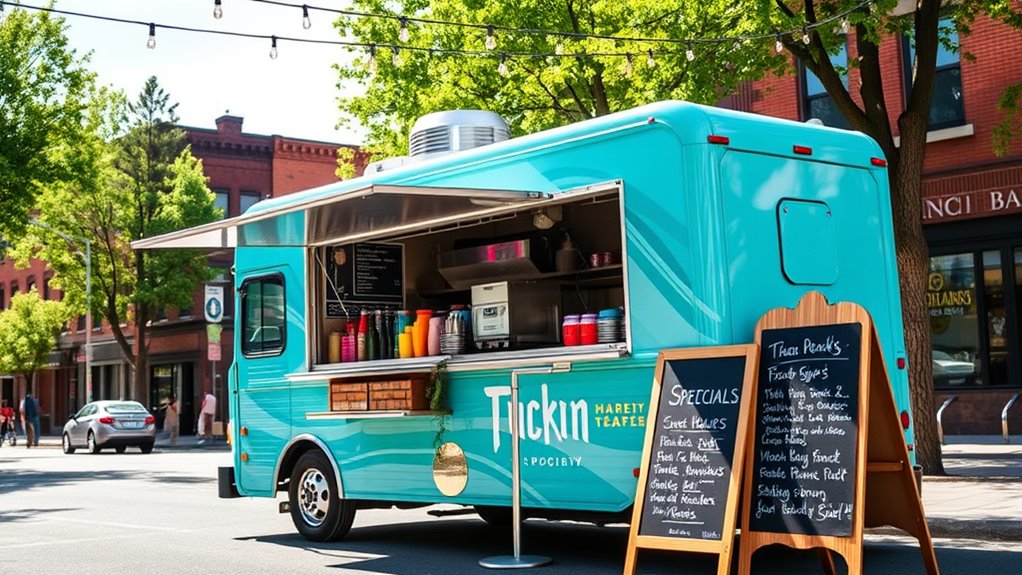
When setting up your base of operations, you’ll need to consider shared kitchen licensing requirements to ensure compliance with local health regulations. Planning your custom kitchen layout is vital for efficiency and safety, so think about how each space will be used. By addressing these points early, you’ll create a solid foundation for your food truck business in Spokane. Additionally, understanding the importance of health-conscious strategies can help prevent burnout and fatigue, ensuring your operations run smoothly.
Shared Kitchen Licensing Requirements
Setting up your food truck in Spokane requires obtaining the proper shared kitchen license to legally operate your base of operations. This guarantees you meet local health and safety standards through shared kitchen licensing. You’ll need to submit compliance documentation showing your facility adheres to sanitation and food handling regulations.
Key requirements include:
- Registering your shared kitchen with Spokane health authorities
- Providing detailed floor plans of your setup
- Maintaining sanitation logs for cleaning routines
- Ensuring proper storage of ingredients and equipment
- Passing health inspections to verify compliance documentation
Securing this license not only keeps you legal but also builds trust with customers. Focus on understanding these licensing requirements early to streamline your setup process.
Custom Kitchen Layout Planning
Designing your custom kitchen layout is a crucial step to guarantee your food truck operates efficiently and safely. Your kitchen layout should maximize space while ensuring smooth equipment placement, allowing you to move quickly during busy hours. Plan your equipment placement carefully, placing cooking appliances near prep stations and sinks for easy access. Consider how your workflow flows from storage to cooking to serving, reducing unnecessary movement. Adequate ventilation and proper placement of fire safety equipment are also essential for safety. Use a logical layout that minimizes clutter and keeps everything within reach. By thoughtfully planning your kitchen layout, you’ll improve productivity, ensure compliance, and create a safe working environment for yourself and your staff.
Budgeting and Financing Your Food Truck
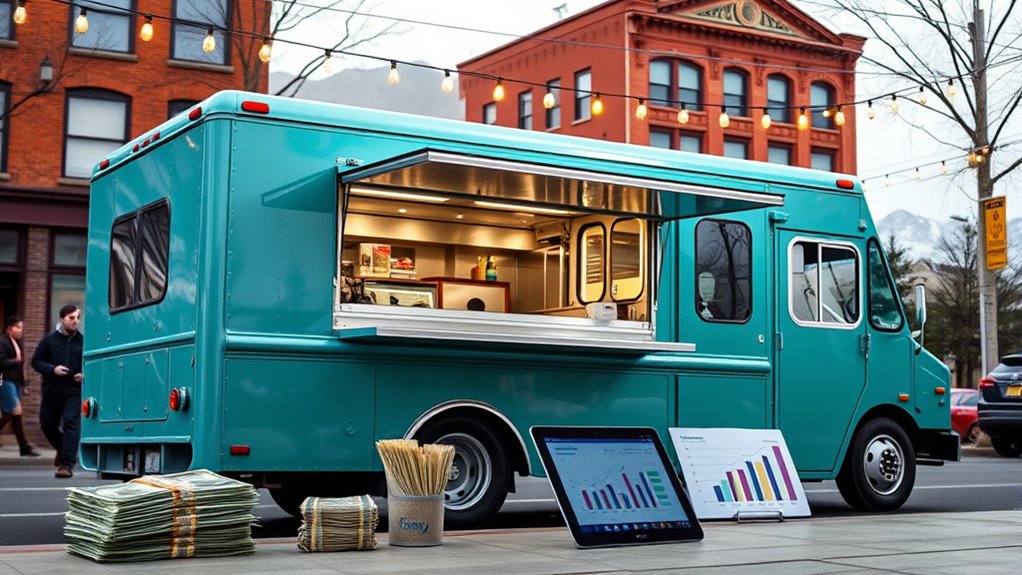
Getting your food truck off the ground starts with understanding your initial purchase costs and exploring local financing options. You’ll also need to budget for liability insurance to meet Spokane’s requirements. Knowing these key points helps make sure your business is financially prepared from the start. Additionally, allocating funds for regular maintenance and filter replacements for any air purification equipment you may install can help maintain a healthy environment within your truck. Air Purifier Maintenance Dos and Don’ts
Initial Truck Purchase Costs
Purchasing your food truck is a significant upfront investment, and understanding the costs involved is essential for effective budgeting. Your initial truck costs will cover the vehicle itself, which varies based on size, age, and condition. These vehicle expenses can range from used models at $20,000 to brand-new trucks exceeding $100,000. Additional costs include customizing the truck with kitchen equipment, signage, and permits. Keep in mind that upgrading or refurbishing an older truck may increase your initial expenses. To budget accurately, consider factors like:
- Used vs. new truck prices
- Customization and equipment costs
- Licensing and permits
- Vehicle registration fees
- Insurance expenses
Knowing these costs helps you plan financially and avoid surprises as you launch your Spokane food truck.
Local Food Truck Financing Sources
Securing funding for your Spokane food truck can feel overwhelming, but knowing where to turn can make the process smoother. Start by exploring local financing options, such as small business loans from Spokane-based banks or credit unions familiar with the local food scene. Community development organizations may also offer grants or low-interest loans tailored for new food entrepreneurs. Additionally, consider crowdfunding platforms to gather support from local food fans. Understanding local requirements is vital—familiarize yourself with Spokane’s licensing and permitting processes, which can impact your financing eligibility. Sometimes, local investors or food-focused economic development programs are willing to invest in promising food truck concepts. By tapping into these local sources, you can secure the funds needed to launch and grow your food truck business in Spokane.
Liability Insurance Requirements for Food Trucks
Liability insurance is a crucial aspect of budgeting and financing your food truck, as it helps protect your business from potential claims and legal expenses. Without proper liability coverage, unexpected accidents or injuries could threaten your financial stability. You’ll need to research insurance policies that meet Spokane’s local requirements and ensure thorough coverage.
Consider these key points:
- Minimum liability coverage amounts required by law
- Types of damages covered, including property damage and bodily injury
- Additional coverage options like general liability and product liability
- Finding affordable insurance policies without sacrificing coverage
- Understanding policy exclusions and limitations
Having the right insurance policies in place ensures your food truck stays protected, so you can focus on serving delicious food and growing your business.
Designing Your Menu and Pricing Strategy
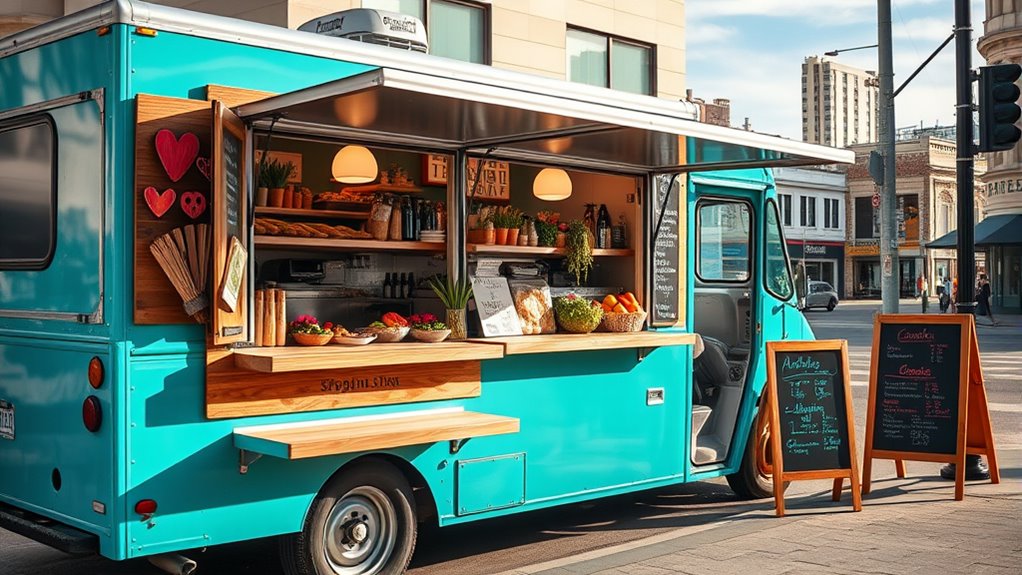
When designing your menu, focus on customizing dishes that appeal to Spokane’s local tastes and preferences. Consider offering affordable options that attract a broad customer base without sacrificing quality. By balancing unique offerings with cost-effective choices, you can create an inviting and profitable menu. Incorporating menu planning strategies can help ensure your offerings align with both customer desires and operational efficiency.
Customizing Dishes for Spokane
To succeed in Spokane’s vibrant food truck scene, you need to craft a menu that appeals to local tastes while maintaining flexibility. Focus on incorporating local flavor by highlighting regional ingredients and adjusting dishes based on seasonal availability. Building relationships with local suppliers ensures authentic ingredient sourcing, which resonates with customers seeking genuine Spokane flavors. When customizing dishes, consider these tips:
- Use locally sourced produce to enhance freshness
- Incorporate regional favorites or twists on classic recipes
- Offer versatile options that can be easily adapted
- Price dishes competitively, reflecting ingredient costs
- Highlight local ingredients on your menu for authenticity
Affordable Menu Item Strategies
Creating an affordable menu that appeals to Spokane’s diverse customer base starts with strategic planning around pricing and item selection. Focus on creative menu design by offering versatile dishes that can be easily customized or scaled for different budgets. Use ingredient sourcing wisely—opt for local, seasonal ingredients that are cost-effective and fresh, helping you keep prices low without sacrificing quality. Simple, well-executed recipes often resonate more than complicated dishes, so streamline your offerings to maximize efficiency. Consider bundling items or offering daily specials to attract more customers while maintaining profit margins. Regularly review ingredient costs and adjust prices accordingly to stay competitive. By combining creative menu design with smart ingredient sourcing, you can craft an affordable, appealing menu that keeps customers coming back.
Technology and Operations
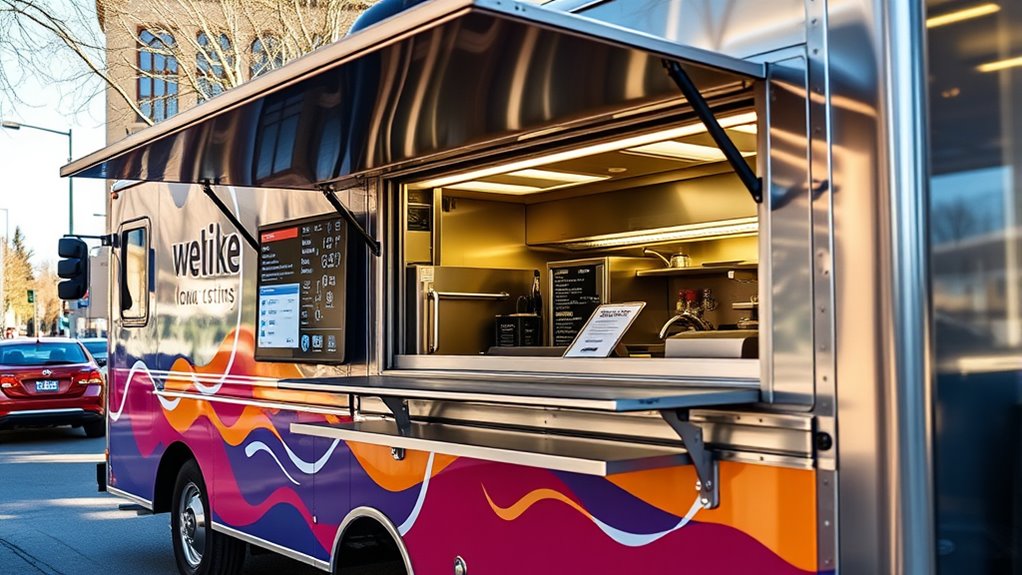
Using wireless card readers and apps can streamline your transactions and reduce wait times. Mobile POS systems help you manage orders and payments on the go, keeping your service smooth. Additionally, stock tracking tools let you monitor inventory in real-time, so you stay prepared for busy days.
Wireless Card Readers and Apps
Wireless card readers and apps have become essential tools for food trucks like those in Spokane, enabling quick and secure payment processing on the go. They simplify accepting cashless payments, making transactions faster and more convenient for customers. These devices connect seamlessly to your POS systems, reducing wait times and improving customer experience. Plus, their portability means you can take payments anywhere without bulky equipment. Many options offer real-time sales tracking, inventory integration, and fraud protection to keep your operations smooth. Staying updated with these tools helps you stay competitive and meet customer expectations. Whether you’re at a busy event or a quiet street corner, wireless card readers and apps ensure your payment process is efficient and reliable.
- Easy setup and integration with existing POS systems
- Support for multiple payment methods including contactless
- Enhanced security features to safeguard customer data
- Real-time sales reporting and analytics
- Portable, battery-powered design for on-the-go use
Mobile POS and Stock Tracking
Mobile POS systems and stock tracking tools streamline daily operations for food trucks in Spokane by providing real-time updates and simplified inventory management. With a digital payment system, you can accept various payment methods instantly, reducing wait times and enhancing customer satisfaction. These systems automatically track inventory levels, alerting you when supplies run low, so you can reorder efficiently. This integration minimizes errors and helps you keep accurate records of sales and stock, saving time and reducing waste. By using a mobile POS, you can process transactions on the go, whether you’re at a festival or busy street corner. Overall, these tools boost efficiency, improve cash flow, and enable you to focus more on serving great food rather than managing logistics.
Marketing and Growing Your Presence
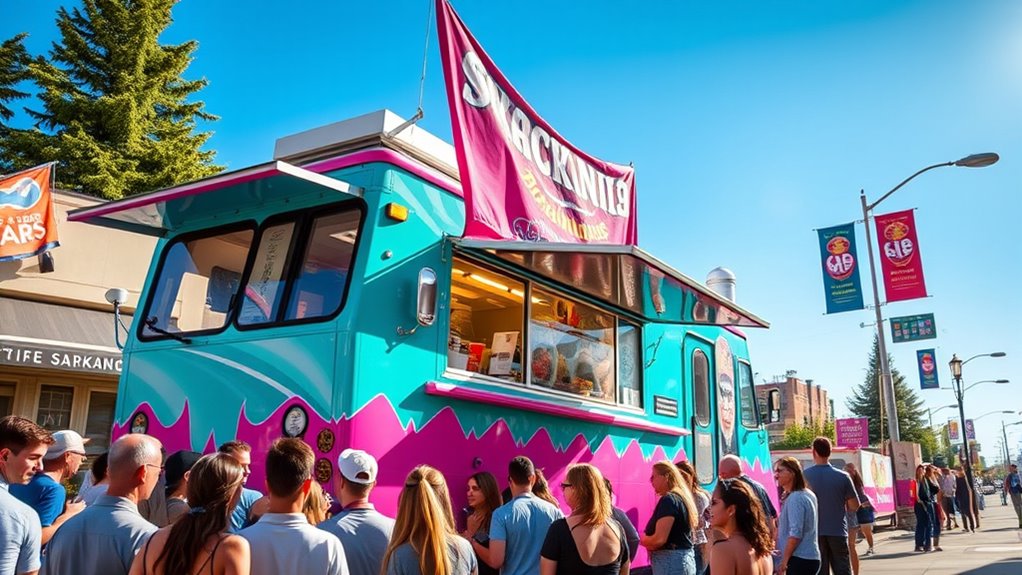
Participating in popular Spokane food festivals is a great way to boost your visibility and attract new customers. Posting engaging, high-quality food photos on Instagram helps showcase your offerings and lure followers to your truck. Combining these strategies can considerably grow your presence in the local food scene.
Popular Spokane Food Festivals
To successfully grow your presence in Spokane’s vibrant food scene, you need to leverage its popular food festivals. These events attract large crowds and are perfect opportunities to showcase your food truck. Participating in farmers markets and food festivals helps you connect directly with local customers and build brand awareness. To maximize your impact, consider these strategies:
- Join well-known food festivals like the Spokane International Food Festival
- Set up at popular farmers markets to reach loyal local shoppers
- Offer samples to entice festival-goers and encourage repeat visits
- Collaborate with other vendors to cross-promote your truck
- Use festivals as a platform to gather feedback and refine your menu
Engaging actively at these events helps you stand out and grow your presence in Spokane’s competitive food scene.
Engaging Instagram Food Photos
Capturing eye-catching Instagram food photos is essential for building your food truck’s online presence and attracting new customers. Focus on high-quality food photography that highlights vibrant colors, textures, and unique angles. Natural lighting works best—shoot during the day when sunlight enhances your dishes. Use close-ups to showcase details and create mouthwatering images. Incorporate props or backgrounds that complement your food without cluttering the shot. Consistently posting appealing photos encourages Instagram engagement, helping your audience connect with your brand. Engage with followers by responding to comments and using relevant hashtags. Remember, visually appealing content makes your food stand out in Spokane’s busy food scene, drawing more people to your truck and boosting your popularity.
Local Community Engagement Strategies
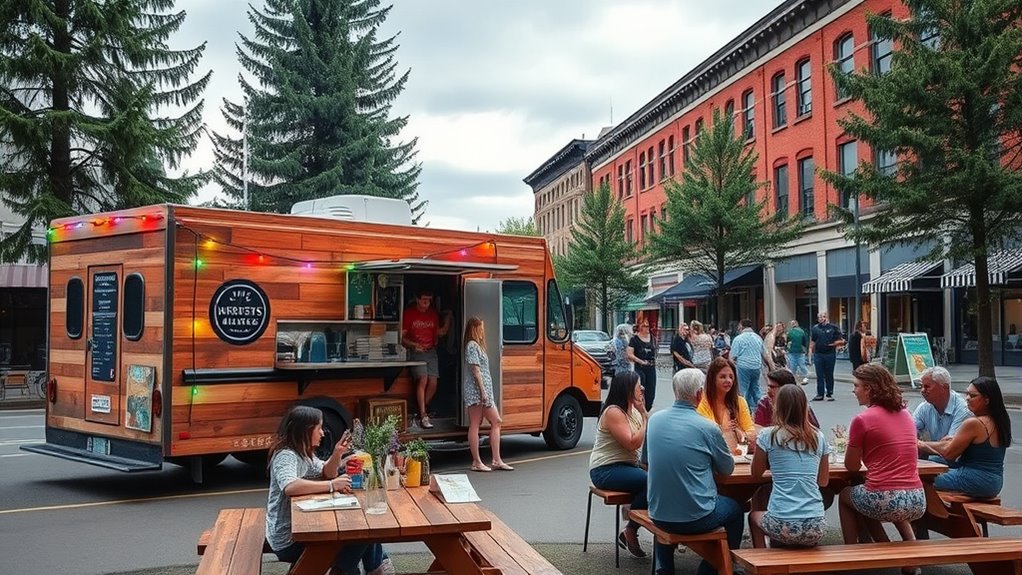
Engaging the Spokane community effectively requires a strategic approach that fosters genuine connections. Building strong relationships with local residents and businesses helps your food truck stand out. You can achieve this through community partnerships and local event sponsorships, which increase visibility and goodwill. Consider partnering with local charities or schools to host fundraisers or food tastings. Sponsoring community events like farmers markets or festivals also puts your truck front and center. Additionally, participating in neighborhood gatherings or supporting local sports teams creates a sense of belonging. Consistent engagement shows you’re invested in Spokane’s growth and culture. These strategies encourage word-of-mouth promotion and loyalty, turning customers into advocates for your food truck. Ultimately, active community involvement makes your food truck a essential part of Spokane’s vibrant scene.
Frequently Asked Questions
What Are the Best Locations to Park My Food Truck in Spokane?
You should park your food truck near busy areas like downtown Spokane, university campuses, and popular parks, considering parking regulations to avoid fines. Focus on locations with diverse customer demographics, such as office districts or event venues, where foot traffic is high. Always research local parking rules and obtain necessary permits. By choosing spots with high visibility and accessibility, you’ll attract more customers and boost your food truck’s success.
How Do I Obtain Health Permits Specific to Spokane’s Health Department?
You’ll want to conquer Spokane’s health department by first filling out a permit application online or in person. Prepare for a health inspection that’s more detailed than a treasure hunt, ensuring your truck meets all safety and sanitation standards. Once you pass, you’ll receive your health permit, granting access to the city’s best spots. Stay diligent, follow Spokane’s health guidelines, and you’ll be rolling smoothly with all necessary permits in hand.
Are There Any Local Food Restrictions or Allergies I Should Consider?
You should be aware of local food restrictions like gluten allergies and the growing demand for vegan options. Make certain to clearly label your menu items to accommodate customers with gluten allergies and offer vegan choices to meet diverse dietary needs. Staying informed about Spokane’s health department guidelines helps you avoid allergen cross-contact and ensures you’re providing safe, inclusive options that attract a wider customer base.
What Are Common Challenges Faced by Food Truck Owners in Spokane?
You’ll face challenges like seasonal fluctuations in Spokane, which can impact your sales during colder months. Vehicle maintenance is essential to keep your truck running smoothly and avoid costly breakdowns. Additionally, managing local regulations and finding reliable suppliers can be tough. Staying adaptable to seasonal changes and prioritizing regular vehicle upkeep helps you succeed. Building strong community relationships also boosts your resilience against these common hurdles.
How Can I Connect With Spokane’s Local Food Suppliers Effectively?
You can connect with Spokane’s local food suppliers by building strong local vendor relationships and attending farmers’ markets or industry events regularly. Use supplier negotiation strategies like offering consistent orders or prompt payments to foster trust. Reach out directly to vendors via phone or email, and visit their farms or stores when possible. Staying engaged and demonstrating reliability helps establish lasting partnerships that benefit your food truck business.
Conclusion
Starting a food truck in Spokane is an exciting journey, but it requires careful planning and community engagement. By understanding local rules, creating a standout menu, and embracing the vibrant food scene, you’ll set yourself up for success. Are you ready to bring your unique flavors to Spokane’s streets and become part of its thriving food community? With passion and persistence, you can turn your food truck dream into a delicious reality.
